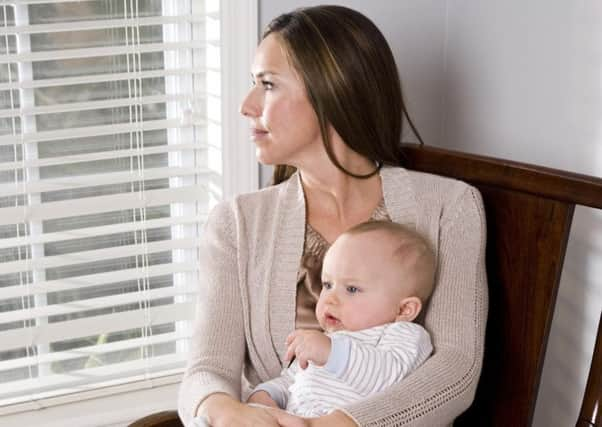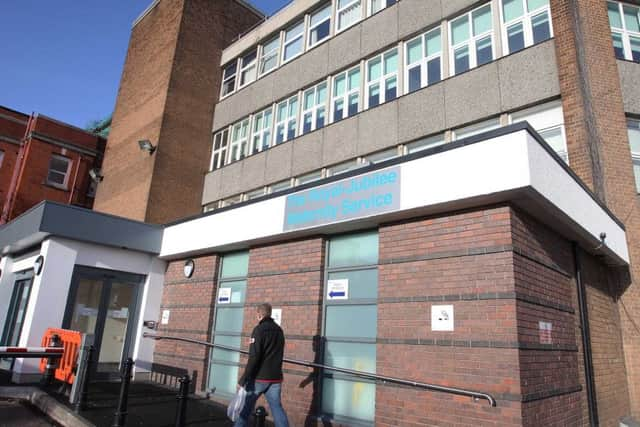Everyone's Business campaign: '˜I wasn't expecting to feel suicidal during pregnancy'


The article focused on my own personal experience.
To scroll back - when I was six months pregnant with my first child the ‘black dog’, Winston Churchill’s famous metaphor for his depression, prowled into my life. Over an alarmingly short period of time I sank into a deep and terrifying depression.
Instead of wistful day-dreams about baby names and nursery colour schemes, I began fantasising about ending it all.
Advertisement
Hide AdAdvertisement
Hide Ad

Looking back it was totally irrational, but at the time it seemed the only escape route from the all-pervading, crushing nothingness I felt.
I couldn’t sleep or eat, the weight dropped off - my pre-pregnancy size 10 jeans swamped me.
The depression, this utter, indescribable sadness, was akin to the feelings I experienced after bereavement - except I was in mourning for myself, the former happy me.
I was totally suicidal; depleted of energy, hope and joy.


I would wake up suddenly at 4am and worry for hours on end about everything from not knowing how to change a nappy to whether I really wanted this baby and if I would love it.
I worried about losing my freedom, my autonomy.
Advertisement
Hide AdAdvertisement
Hide AdI was wracked by guilt and shame. There were lots of women who were desperate to have children and couldn’t. Impending motherhood was meant to be a happy time, a wonderful life-changing event, not a time to be consumed with suicidal thoughts.
My partner and I had waited a long time for the right time and up until that point I had really been looking forward to finally meeting the little baby growing inside me.
But something snapped. Almost overnight I became a statistic, the one in 10 women who suffers antenatal depression. Of course, I was too far gone to realise what was wrong with me.
I felt I would be demonised if I confessed these worries publicly, so I kept them bottled up, spiralling further and further into the taboo world of antenatal depression.
Advertisement
Hide AdAdvertisement
Hide AdFollowing a spate of terrifying panic attacks, I went to an out-of-hours doctor. He quickly dismissed them and said I couldn’t take any medication since I was pregnant. He told me to go home and have a cup of coffee with lots of milk. I thought if he can’t help me, who can?
Eventually, as the depression got worse, I saw a more sympathetic doctor. Before prescribing anti-depressants, she told me about the risks and benefits of taking medication during pregnancy, but in the end we decided this was the best option.
Also, because I was feeling suicidal it was decided I needed to be admitted to a psychiatric unit.
Unfortunately, there are no specialist psychiatric facilities in Northern Ireland, or indeed Ireland, for women with antenatal or postnatal depression, so I spent the first week of my hospitalisation on a general psychiatric ward in Windsor House at Belfast City Hospital.
Advertisement
Hide AdAdvertisement
Hide AdWindsor House was a grim, grey building; Dickensian and decaying; it was the scary mental asylum of my imagination. Thankfully it closed some years ago.
On arrival there I was sent to a tiny, joyless, square room to await the consultant psychiatrist. It had a table, two plastic chairs, no curtains, a stained carpet and harsh overhead lighting; not unlike a police interview room.
After an interminable four hours the psychiatrist arrived and following two hours of questioning at 1am I was finally taken to the ward by a disinterested nurse, unmoved by my tears and obvious distress.
Windsor House had a lounge area, but I avoided it because it was open to the mentally ill men from the adjoining ward. I simply didn’t feel comfortable. An environment such as this is simply not conducive to healing; futhermore it was an atrocious place for a pregnant woman to be.
Advertisement
Hide AdAdvertisement
Hide AdLuckily after a week, I was transferred to Knockbracken Healthcare Park in Belfast.
It was a breath of fresh air to be in a modern building, and in a unit which was female-only.
I took the medication and began to improve in tiny steps. However , the fallout from depression lingers long after the black dog has retreated.
Antenatal depression is an extremely lonely illness, because you believe you are the only one in the world feeling this way.
Advertisement
Hide AdAdvertisement
Hide AdThe classic motherhood bibles are strangely quiet on the subject or give scant reference to it.
It was not an easy decision to write about my experiences of depression, but I have done so because I believe we need to re-think how women with serious antenatal and postnatal depression are treated in Northern Ireland.
It is simply not good enough to shove us on to general psychiatric wards, because there is no where else to put us.
Since I was ill nine years ago, nothing has changed in terms of inpatient care for women with perinatal mental health issues. It breaks my heart. This simply cannot continue in the 21st century.
Advertisement
Hide AdAdvertisement
Hide AdWe need a specialist unit, where women and their children get appropriate care and attention. It is, without exaggeration, a matter of life and death,
We need your support to lobby the government for this much-needed facility.
*If you feel you would like to back the Everyone’s Business campaign, please get in touch. Email: [email protected] or telephone 028 90897720.